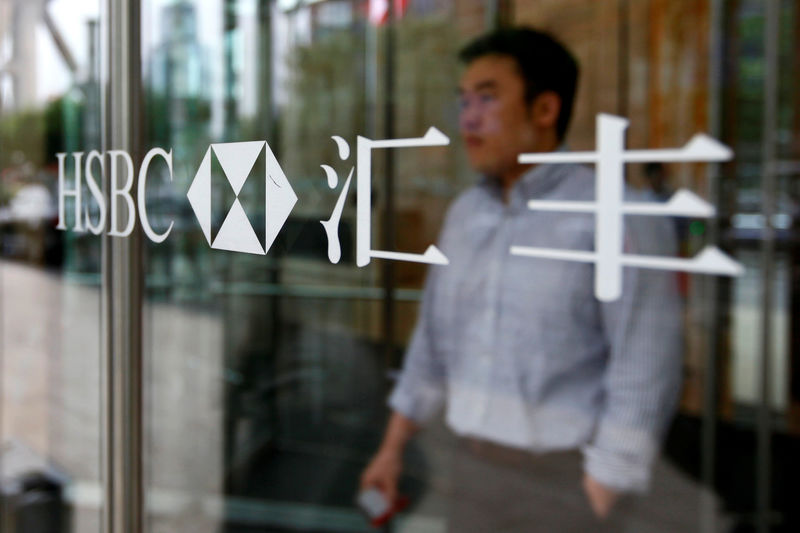By James Pomfret, Lawrence White and Sumeet Chatterjee
DONGGUAN, China/LONDON/HONG KONG (Reuters) - In the digital age, footfall in bricks-and-mortar outlets is an incomplete measure of business activity, but HSBC's empty branches in the Pearl River Delta (PRD) suggest it's not all plain sailing for the bank's expansion in mainland China.
HSBC, the world's sixth-largest bank by assets, announced in 2015 that it would hire 4,000 new staff and invest billions to make the Pearl River Delta (PRD) its gateway to China, a retail and corporate banking push that bet on a tech boom, infrastructure spending and a growing middle class.
It is, as Chief Executive Stuart Gulliver reminded shareholders in Hong Kong on Monday, a key plank of the bank's global strategy to improve profits by focusing on markets with stronger economic growth. PRD already generates more than 10 percent of China's GDP and over a quarter of its exports.
On the ground, HSBC still has a mountain to climb.
In a rundown mall in Houjie, a factory town in the urban sprawl of Dongguan, the HSBC branch stands out with its bright posters and smiling receptionist, but only a handful of customers an hour crossed the threshold during a Reuters visit last week.
At the nearby Industrial and Commercial Bank of China (ICBC) branch in Changan, dozens rolled up in a similar period.
Large local rivals in the PRD, most state-backed, each have more than 1,000 branches to HSBC's 114 including Guangdong, and they don't have the headache of the tough compliance rules that HSBC has to follow to safeguard its international business.
It's a headache the bank has to pass on to prospective customers.
A factory owner who gave his surname as Luo said he opened an HSBC account last year to facilitate his business making wooden floorboards and panels for clients in Hong Kong, where HSBC was founded in 1865.
Luo, who spoke to Reuters as he was leaving the Houjie branch, represents the kind of affluent Chinese customer with business in Hong Kong that the bank is keen to snag.
But opening a bank account was "quite a lot of trouble", he said, and took nearly two weeks.
HSBC's customer-checking procedures have got tighter in recent years after it was hit with billions of dollars in fines in the U.S. for lapses in anti-money laundering controls.
A HSBC staff member at the branch, who declined to be named, confirmed that customer background checks can take longer than at local banks that have no or negligible U.S. business at risk and are not subject to global regulatory scrutiny.
MAKING PROGRESS
HSBC says it is pleased with its progress in China. At the start of April it had 150,000 credit cards in circulation, having begun to issue them in December, mostly after digital applications.
It has also launched online trading and banking over social media platform WeChat.
"We do not intend to compete on a traditional basis in PRD. Absolute branch numbers and footfall will not be our measure," said Kevin Martin, HSBC's Asia Pacific head of retail banking and wealth management.
But that's a game its big rivals are also playing; ICBC, for example, has offered WeChat banking since 2013.
Since HSBC announced its strategy in June 2015, China's slowing growth and a stock market crash have prompted a rethink on the pace of expansion.
CEO Gulliver said last year it would take on the 4,000 new regional hires over five years, not three, as initially planned.
"Quite rightly, management felt at that time they didn't want to achieve the strategy by taking on more risk," Sam Laidlaw, an independent board member at HSBC, told Reuters.
Investors remain broadly positive.
"It's not an overnight thing, and of course everyone wants it to be faster. The (China) strategy should be pursued – but it is only one of many strategies for HSBC," said Hugh Young, Singapore-based fund manager at Aberdeen Asset Management, HSBC's 6th-largest shareholder.
And what figures the bank has disclosed for 2016 are encouraging, albeit from a low base; it said in its annual report that its number of retail banking and wealth management clients and its mortgage loan book in the area had both increased by 51 percent during the year.
But it also has some battles with red tape to win.
The lender is still waiting for approval for its securities business venture with a state-owned fund in the PRD, more than a year after it announced the partnership.
And some say the bank remains something of an outsider.
At the Ling Jia Property Agency, a few meters from HSBC's Houjie branch, realtor Yi Linfeng said most of his customers use ICBC for mortgages. None, he says, have ever used HSBC.

"I think they mostly have foreign customers from Taiwan and Hong Kong."